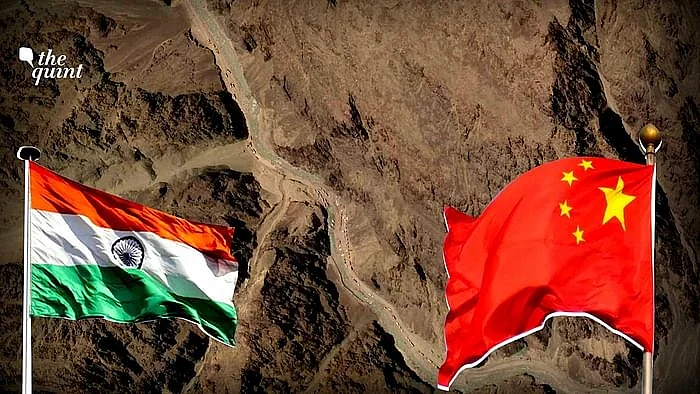For the past few years, the security environment in Asia has been covered by clouds of distrust and suspicion. From the Doklam stand-off to the Galwan Valley clash, China has frequently broken its promises and India’s trust.
The Pentagon report of 2021, too, confirms China’s two faces towards India. The report says, “Despite the ongoing diplomatic and military dialogues to reduce border tensions, the PRC has continued taking incremental and tactical actions to press its claims at the LAC.”
This has been a long territorial strategy of the Chinese Communist Party (CCP) for future claims and control. For instance, in 1995, despite numerous diplomatic engagements with the Philippines, China continued to upgrade its physical presence on the Mischief Reef.
Infrastrucure & Symbolic Integration of People
The report further added, “Sometime in 2020, the PRC built a large 100-home civilian village inside disputed territory between the PRC’s Tibet Autonomous Region and India’s Arunachal Pradesh state in the eastern sector of the LAC.”
In an insightful paper written by Ron E. Hassner, ‘The Path to Intractability: Time and the Entrenchment of Territorial Disputes’, the author argues that the construction of material links (for example, roads) and symbolic links (such as temples and churches) in the disputed territory would further integrate the disputed territory in question with the occupying state.
For instance, in the case of Golan Heights, to support a handful of settlers and improve the mobility of its military forces, the government initiated an extension of Israel’s road and water infrastructure into Golan. Israel’s bus lines started serving Golan residents in 1968.
All the above activities further strengthened the ties between the disputed territory and the occupying state. Hence, it becomes more difficult to compromise in the future, because the disputed territory in question has been symbolically as well as materially linked to the occupying state.
In other words, the construction of infrastructure always carries political significance. In the context of border governance, it symbolises the imposition of the state’s territoriality—as both the marker of sovereign space and as a biopolitical intervention. In short, by the alleged construction of a large 100-home civilian village inside the disputed territory, China has already started the process of entrenchment.
Taiwan National Defense Report on China
Recently, Taiwan’s Ministry of National Defense also released its annual ‘ROC National Defense Report 2021’. For the first time, to boost communication between Taiwan and other foreign countries amid the rising military threats from China, the report was released in Chinese and English language simultaneously.
The first chapter on the security environment says, “The strategic competition between the US and the PRC is impacting the geopolitical and security situations in the Indo-Pacific region. On the one hand, the US continues pushing for cooperation with regional allies and partners … In addition, mounting non-conventional threats coupling with more pervasive cross-regional and composite impacts require all countries in the region to join hands and react.”
It alludes to the strengthening relationship between the US and India and the need for the Asian countries to join hands against the rising aggression of China. Beijing is involved in a series of serious disputes with countries in these regions: the South China Sea, East China Sea, and the India-Tibet border. On the India-China relationship, the report gloomily reads: “The territorial dispute between them is unlikely to be resolved anytime soon.” The first chapter also touches upon the People’s Republic of China’s expansion of geopolitical influences through its comprehensive national power and the use of economic clout and grey-zone tactics to change the international order.
Both the US and Taiwan are wary of China’s “assertive role in global affairs” and its “attempt to change the international order”.
In short, both the US and Taiwan recognise the increasing challenges posed by China to a stable and open international system.
Why Does Tibet Matter?
The infrastructure development in Tibet has been one of the topmost priorities for China. Tibet 2020: A Year in Review, published by the Tibet Policy Institute, Dharamshala, reads:
“The 14th Five-Year-Plan shows China’s interests in expanding connectivity between Tibet and East Turkestan (Xinjiang) with railway lines in addition to highways links. It is mentioned in its current FYP that China will ‘strengthen the construction of strategic backbone corridors out of Xinjiang and into Tibet’ which includes the up-gradation and extension of the G219 (Xinjiang-Tibet) and G331 (Dadong to Altay) national highways as well as the G318 Sichuan-Tibet Highways. Interestingly, all these strategic highways run parallel to one another along Tibet’s border with India. In the past, too, after the invasion and entrenching in Tibet, the CCP started building and strengthening its road networks, connecting all border regions of Tibet, including borders shared by Tibet with India. The East Turkestan (Ch: Xinjiang)-Tibet highway, which was completed in 1957, passes through the Indian territory of Aksai Chin.”
At the recent Times Now Summit, India’s Chief of Defence Staff, General Bipin Rawat, said “China is the biggest security threat facing India.” He further added that “a lack of trust” and growing “suspicion” is coming in the way of resolving border disputes between the two nuclear-armed neighbours. Hence, in the future, whatever happens inside Tibet may matter for the Indian security environment and that of Asia as well.
(Tenzin Tsultrim earned his Ph.D. from the University of Madras, Chennai. Currently, he is a Research Fellow at the Tibet Policy Institute, a think tank of the Central Tibetan Administration, Dharamshala, India. This is an opinion piece and the views expressed above are the author’s own. The Quint neither endorses nor is responsible for them.)
